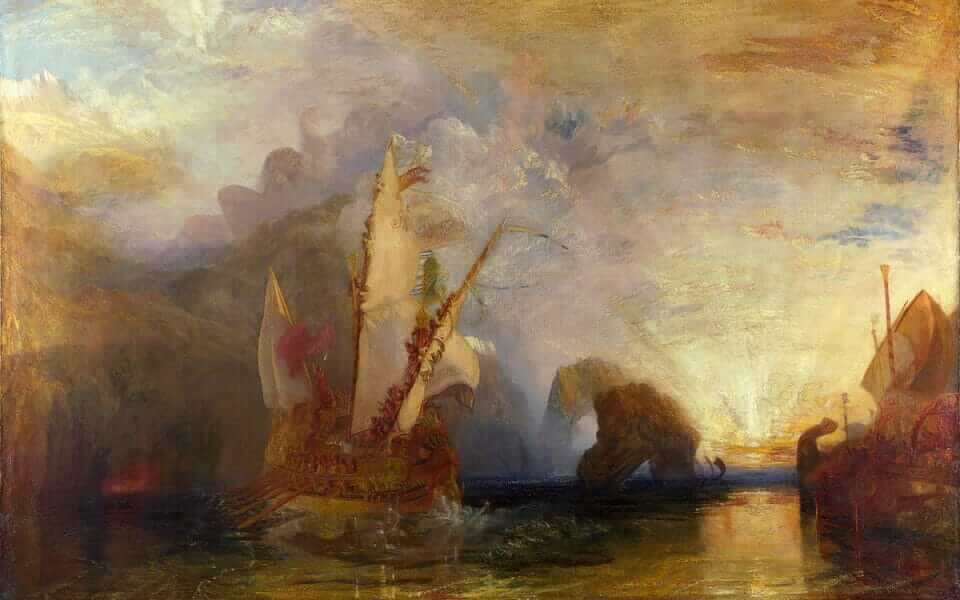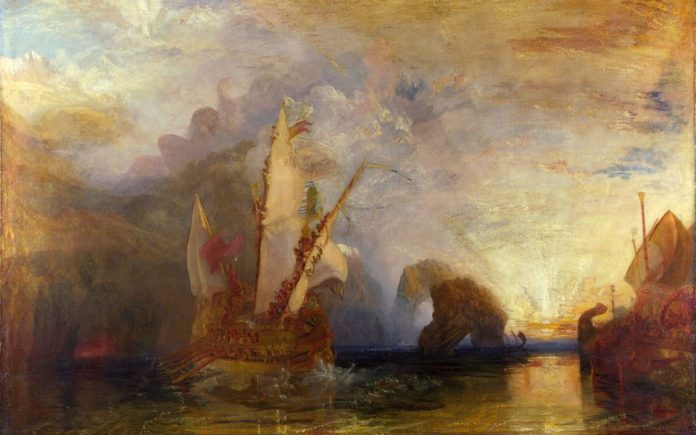
“Odysseus is the first recognizably Western man.”
“Now halt the strife of inexorable war.”
– Homer, The Odyssey
“Let our brilliance make them look dark. No, let us not become darker ourselves on their account, like all those who punish…Let us look away.”
– Friedrich Nietzsche, The Gay Science
Homer ends the Odyssey with an exhortation from the god Cronus to Odysseus to stop perpetuating the cycle of wars of revenge and initiate a new era of peace and love, supervised by the goddess Athena. In Greek mythology, Cronus had ruled the Titan gods during the mythological Golden Age that had vanished long before the Trojan War; and Athena was the goddess not only of war but also of wisdom and the arts. The implication is that Odysseus became a wise and just ruler, dispensing kindness through strength.
Homer is presenting an argument on two levels. The Golden Age might be gone, but great men can strive to regain it through heroic means that are a departure from the unrestrained brutality of mortal combat between nobles―the result of an honor culture that made endless revengeful blood-feuds a major preoccupation for those of noble birth. And the means of attaining this new golden age will be a culture of amity and harmonious relations that celebrates human achievements other than war, maintaining peace through wise leadership, even if the capacity to wage war is one of the principle means of maintaining peace.
This sentiment is a major departure from the cultural milieu explored in the Iliad. It represents an awareness that mortal conflict and brutal heroism, cruelty, and continual strife might give way to a new age prompted by the emergence of a new kind of human being, an individualist and cultural innovator. A prototypical Nietzschean life-affirming heroic individual but also one who transcends partisan identities to achieve an integrated, unitary sense of being. In doing so, this individual brings out the best in people. He is capable of forging a harmonious society of peaceful cooperation: one committed to seeking excellence of being, rather than conflict based on identity distinctions.
The term ‘identity politics’ is a recent innovation, but the idea of dividing society into competing, mutually-antagonistic groups narrowly-defined by a non-integrated partisan sense of identity is not new; in fact, it is as old as history itself. But for those wishing to bring peace and harmony founded on goodwill, the challenge is to integrate the sources of identity into one unitary whole. The idea that this is a struggle that begins within the individual was addressed by Homer in the Odyssey. It was later taken up by Aristotle, then by Christian theologians, and much later by Kant, Nietzsche, and then Freud, and by many others since.
What makes the link between Homer and Nietzsche so interesting is that both, in effect, present the inner struggle as being about the intuitive (rather than rational) grasp of what it is to be a unitary being, rather than this achievement being the result of a process of rational self-development. Nietzsche explored the challenge of integrating the sense of self into one unitary sense of being, but Homer got there long before he did.
Iliad and Odyssey: An Archaic Warrior-Hero Culture in Transition
Homer’s two epic poems can be seen as marking the beginning of a transition from an archaic mode of life to a new way of understanding the human predicament and potential.
The Iliad presents a partial account of this transition. The Achaeans are obsessed with manly virtues and the preservation of their honor, as well as their status as warrior-heroes. This culture failed the Achaeans at Troy, who after ten years were facing defeat. The situation was resolved by a new kind of man, Odysseus, king of Ithaca, a man of many talents but one who was held in low esteem by his peers.
He provided the cunning and inventiveness to enable the Achaeans to overcome the Trojans by means of clever―but very unheroic―guile and trickery. Homer’s argument here is that this is not really much of an improvement. Troy is destroyed and most of its inhabitants killed or enslaved, but the victorious Achaeans are much depleted in numbers, and the booty they obtain does not make up for all the lives and treasure they have expended on the war.
The Odyssey, in contrast, presents a new kind of narrative: a deeply personal account of the struggles of one man as he endures the punishment of the gods for his usurpation of their powers (of guile and trickery) over mortals. During his voyage home, Odysseus discovers that he is capable of imposing brutal self-discipline in a way that inspires gentler sentiments. He also realizes that he is able to conceptualize both himself and others in a completely new way. He becomes a true leader, unlike his fellow nobles who are driven by instinct, superstition, and violent emotions. He is not consistent; to this point, after his return home, he wages vengeful war on Penelope’s suitors.
At the very end of the Odyssey, Homer introduces the idea of a very different approach to the settling of disputes: to explore ways of arriving at non-lethal justice, to focus on building and maintaining relations based on goodwill so as to avoid further conflicts from breaking out. Although Homer’s account is presented in terms of the influence of Cronus and Athena on Odysseus, this is a literary device to introduce an idea so novel that to present it in any other way would have bemused his audience.
During his ordeals, Odysseus has had to dig deep within himself to discover a new attribute then unknown in Greek culture (and not described in these terms at all by Homer). This is the faculty of will over hubris: the capacity to overcome pride and impulsiveness in order to strengthen one’s sense of unity of being. This issue was later explored by Aristotle in his Nichomachean Ethics, with the idea of the Golden Mean and overcoming weakness of will (akrasia), and he combined it with the idea of virtuous friendship based on mutual goodwill. For Aristotle, this was the basis for a peaceful, just, and harmonious society and polity. Later still, Christian universalism offered the idea of goodwill as being an expression of amity without the necessity of the bond of mutual friendship.
Nietzsche had little use for Christian universalism; for Aristotle’s idea of virtuous friendship; or Homer’s earlier vision of a political culture of amity and harmonious relations. But he did view the integrated, unitary sense of being as emerging from the “will to power” and “self-overcoming.”
Self-Overcoming to Achieve an Integrated, Unitary Sense of Being
Nietzsche’s “will to power” is the necessary and deterministic force of nature expressing itself in all things, living or otherwise. For Nietzsche, living is but a specific form of the “will to power,” and, as such, it is an expression of nature. It is not intrinsically different from things that are not alive. His materialism and natural determinism have, as an inevitable consequence, claimed that everything is related to everything else, spatially as well as temporally. We, humans, are part of the ever-unfolding process that constitutes the universe. The fullest expression of the “will to power” is to be life-affirming—that is, to celebrate everything that we are now while trying to become everything that we are not but are necessarily going to become (even if we do not yet know it). At the same time, we will never become fully human unless we love everything that we are.
Thus, Nietzsche’s “will” is not free will in any conventional sense; it is the multitude of varieties of the force of nature seeking full expression, even as they compete with one another. This is why competition and conflict are necessary and inevitable in nature and in human society. It is also why Nietzsche increasingly looks inwards for an explanation of how humans can reconcile the various competing natural forces within themselves and construct an integrated, unitary sense of being through overcoming the self.
The unitary sense of being we each have is the result of the individuation of the “will to power” forging self-integration. Nietzsche conceived of this as being the expression of the faculty of will. The human will is not an act or deed or stipulation; it is being continually in the process of becoming. The “will to power” has been misinterpreted as meaning only the desire for power over others; however, in fact, this is only part of its expression. Further, in this externalized form, it may be creative or destructive, life-affirming or life-denying.
Nietzsche’s assertion that “you shall become the person you are” is about embracing one’s fate but also allowing the natural forces of life to give rise to life-affirming expression, even if in competition with other-selves intent on doing the same. The question arises as to whether this entails a social and cultural determinism. Nietzsche gives the impression that cultural development is possible, and that we can strive (through art and its appreciation) to become as fully human as possible. This does not necessarily mean that we have achieved anything ourselves, just that we have allowed the natural forces within us full expression. But if this is the case, is it not equally a natural phenomenon that we should seek to punish those who give us cause for offense? Nietzsche tells us to “look away” instead. There is enough conflict in the world already to have any more than is absolutely necessary.
For Nietzsche―who loved paradoxes and contradictions―conflict can be life-affirming. We see natural forces opposing one another all the time, and, out of this opposition, comes something new: a force in another direction or a new manifestation of nature seeking full expression. In this way, Nietzsche conceives of the emergence of the idea of personal sovereignty―a person’s capacity to conquer the darker side of natural inclinations―as itself being a development of human nature. Whether this is a sufficient explanation is another matter; however, what is missing in Nietzsche’s account is the idea that goodwill―in being unique to human beings―functions as an indication of personal sovereignty. But this is precisely the road that Homer has Odysseus travel.
Odysseus as a Sovereign Individual
The final event in the Odyssey is also the final stage in a process of self-development undergone by Odysseus from the time he leaves Troy to sail home. The Odysseus who set sail from Ithaca to Troy was a young man of noble birth, but he was viewed by his peers somewhat unfavorably. He tried to get out of going to war (his wife had just given birth), though he had been one of those who initially supported the idea. He was known as being crafty and cunning and perhaps even a little wise, but the Greek warrior-heroes looked with disdain upon these qualities. Probably worst of all, he was an accomplished bowman, renowned for his marksmanship. None of these characteristics were associated with the archaic Greek warrior-hero ethos of andreia (manliness). When Odysseus leaves for Troy, his great bow remains behind; he will fight without it.
Odysseus is only one of many noble figures in the Iliad, all of whom are portrayed by Homer in two-dimensional terms—that is, they have no depth to their characters. They attribute their motivations and sentiments to influence from the gods, and they know only two kinds of reward in life: those gained from excelling as a warrior-hero and, then, the bodily pleasures gained from food, drink, and sex. They celebrate their victories and lament the loss of their comrades, as do any warriors. They quarrel endlessly, but one never gets the sense that there are deeper, more complex sentiments resulting from any faculty of introspection and self-criticism, or an aspiration to be anything different than what they already are.
The Odysseus who returns to Ithaca after 20 years away is almost unrecognizable in these terms. During his long journey home, he has again successfully defied the gods and again won, enduring many ordeals and overcoming much adversity. Yet, at the end of the Odyssey, Odysseus is presented as having achieved real depth of character, self-insight, and self-control.
This is signaled by Homer in the exhortation of Cronus to end the wars of revenge and the cycles of feuding, as well as Athena’s role as Odysseus’ mentor in his striving to make a better world. For the first time in Western history, we get an impression of the recognition of the potential for human progress. Homer’s Odysseus is a man of real existential depth, and this is the result of an inner struggle to overcome his own limitations. And it all happens intuitively—not through any quasi-Socratic questioning.
Nietzsche believed that Western culture and civilization had taken a wrong turn with Socrates’ promotion of rational deliberation as the only route to truth, downgrading the grasp of truth directly without the mediation of reason (Kant termed this “intuition”). Truth was a contested idea long before Socrates, and Nietzsche argued that without truth, nihilism triumphs. Classical Greek drama was an attempt to hold back nihilistic sentiments, but the cultural force of Greek drama declined during the Hellenic period. In turn, the defense against nihilism was weakened. Christianity emerged as the bulwark against nihilistic catastrophe for 2,000 years, and when that began to fail, the simmering ressentiments of nihilism erupted again. The counter-poise was Nietzsche’s “noble soul.”
Nietzsche’s heroic individualism represents the path that his “noble souls” take in their striving to become fully human. In pre-Socratic Greece, the only figure who comes anywhere close to Nietzsche’s “noble soul” is the legendary Odysseus, who in Homer’s Odyssey achieves an integrated, unitary sense of being as a result of his inner struggle for self-knowledge and self-control.
Multiple Self-Interpretations and the Unitary Sense of Being
Odysseus is the first recognizably Western man. His noble compatriots could have been nobles in almost any other culture of the time—that is, products of their society, conforming to its values, even if they quarreled over honor, status, and power. They appear as loose bundles of attributes, and the art of the time gives them little individuality apart from one or two external characteristics: their identity is fragmentary. But Odysseus―at least in the Odyssey―is very different.
Here is a man who also lives in his mind, who grieves over his fallen comrades. He suffers agonies of self-doubt; he misses his wife and child dreadfully; he is horrified to see the spirit of his mother in Hades. He rejects all easy solutions to his torments, and his hubris often leads him astray. He suffers seemingly endless pain and misery during his long journey home. And yet, from all this, he eventually develops a sense of being that enables him to maintain his focus on getting home. Even the offer of immortality from the beautiful semi-divine enchantress Calypso―in return for becoming her eternal lover―fails to persuade him to give up his quest to return home. His love for Penelope is greater. The strength of Odysseus’ bond with Penelope indicates a new evaluation of the status of women―and of the marital bond―then foreign to ancient Greece.
Conclusions
Nietzsche’s view of human life as a text to be interpreted has the primary existential struggle going on inside each individual as the various forces of nature―the “will to power”―compete for expression and dominance. At a psychological, social, and cultural level, partisan identities strive for expression and dominance, as in modern identity politics.
In the Odyssey, we see just this process played out internally, with Odysseus being deprived of all social reinforcement from his home culture as his men succumb on the journey home. He then has to sustain his own sense of self from his own inner resources alone. In effect, he learns a new mental skill: He creates his own narrative. His sense of being and self-concept are narrative constructs that he reinforces through continual reinterpretation, as well as through a deepening of content and context until he arrives home a very changed man: a man of unique character. Odysseus becomes a “noble soul” in Nietzschean terms.
It is easy to dismiss Nietzsche’s model of character-as-literary-construct as being a theory that seems to explain everything, even as it explains nothing; it cannot be proven wrong, after all. But Western culture and civilization are grounded on such an idea nevertheless. This is because, without such unifying effort, our sense of being fragments into partisan identities, each seeking dominance. Nietzsche drew on Homer’s arguments, but the latter had gone further in anticipating the emergence of identity politics by 2,800 years; for Homer, the goodwill that inspires harmonious political relations is impossible without an integrated, unitary sense of being.
Antagonism, hostility, enmity, and war have always been with us, but Homer urges a fundamental change in how we should see ourselves. His two epic poems mark the beginning of the history of Western literature and, hence, the start of Western civilization. What resonates today is the idea that Odysseus achieved an integrated, unitary sense of being and became a sovereign, self-created individual for whom goodwill was a fundamental political principle.
Paul Sturdee is a retired teacher of philosophy who now prefers a life of quiet contemplation. He has also written under the pen name “Wen Wryte.”
Related Articles







